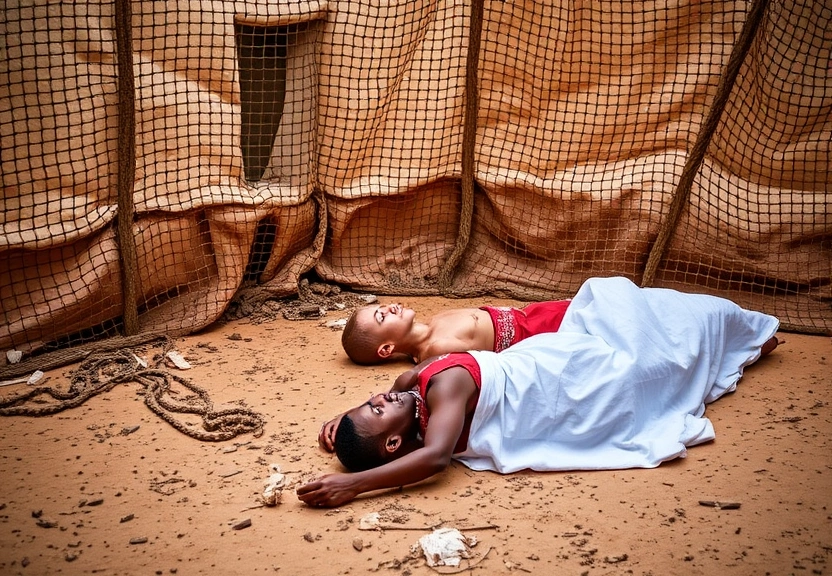UN Demands Probe After Dozens of Bodies Found at Libya Detention Sites
The ongoing humanitarian crisis in Libya has reached alarming levels, prompting the United Nations to call for an independent investigation into the recent discovery of dozens of bodies in militia-run detention facilities in the capital, Tripoli. This revelation not only raises questions about the treatment of detainees but also highlights the broader issues of human rights violations and the lack of accountability in a country that has been plagued by conflict since the fall of Muammar Gaddafi in 2011.

As reports surface regarding the conditions within these detention centers, the international community is increasingly concerned about the safety and rights of individuals held by armed groups. This article explores the implications of the UN’s demand for an investigation, the conditions within the detention sites, and the urgent need for accountability in Libya.
The Context of the UN’s Demand
The United Nations has been monitoring the situation in Libya for years, especially focusing on human rights violations that have become rampant due to the ongoing civil strife. The recent discovery of bodies at detention sites run by militias underscores the urgent need for a thorough investigation. These facilities, often operating outside the framework of Libyan law, have been sites of severe abuse and mistreatment.
Militia Control and its Consequences
Libya has seen various militia groups emerge since the overthrow of Gaddafi, each vying for power and control. These groups operate with a significant degree of autonomy, often disregarding legal norms and human rights obligations. The UN’s report indicates that many detainees are subjected to torture, inhumane treatment, and even extrajudicial killings.
Human Rights Violations in Libya
The discovery of bodies in these detention sites is not an isolated incident but part of a larger pattern of human rights abuses that have plagued Libya for years. Various human rights organizations have documented instances of torture, forced disappearances, and unlawful detentions in militia-run facilities.
The Role of International Human Rights Organizations
Organizations such as Amnesty International and Human Rights Watch have continually reported on the dire conditions within Libyan detention centers. They have urged the international community to take a firm stand against these abuses and to push for accountability and justice for victims.
Impact on Vulnerable Populations
Vulnerable populations, including migrants and refugees, are particularly at risk in Libya. Many individuals fleeing conflict or economic hardship find themselves caught in a cycle of violence and exploitation. The UN has highlighted the need to protect these groups, who often end up in detention facilities where their rights are systematically violated.
Importance of an Independent Investigation
The UN’s call for an independent investigation is crucial for several reasons:
- Accountability: An independent investigation can help hold perpetrators accountable for their actions and ensure justice for victims.
- Transparency: A thorough inquiry can shed light on the conditions within detention facilities and provide a clearer picture of the human rights landscape in Libya.
- Policy Change: Findings from the investigation could lead to significant policy changes, promoting a more humane approach to detention and treatment of individuals in custody.
- International Support: An investigation may mobilize international support for rebuilding Libya’s judicial and law enforcement institutions.
The Role of the International Community
The international community has a pivotal role to play in addressing the human rights crisis in Libya. Following the UN’s call for an investigation, several nations and organizations must act decisively to support accountability measures.
Engagement with Libyan Authorities
Engaging with Libyan authorities is essential to ensure they recognize their obligations under international law. This includes cooperating with the UN and allowing independent investigators access to detention facilities.
Support for Civil Society Organizations
International support for local civil society organizations can help empower Libyans to advocate for human rights and hold authorities accountable. These organizations often serve as the first line of defense against abuses and can provide critical information about conditions on the ground.
FAQs
1. What prompted the UN to demand an investigation in Libya?
The UN’s demand for an investigation was prompted by the discovery of dozens of bodies at militia-run detention facilities in Tripoli, which indicated severe human rights violations.
2. What types of human rights violations are occurring in Libya?
Human rights violations in Libya include torture, extrajudicial killings, forced disappearances, and inhumane treatment of detainees, particularly in militia-run facilities.
3. Who is responsible for the detention facilities in Libya?
The detention facilities are primarily run by various militia groups that operate independently and often without oversight from the Libyan government.
4. How can the international community help Libya address these issues?
The international community can help by supporting independent investigations, engaging with Libyan authorities, and providing aid to civil society organizations working to protect human rights.
5. What is the impact of these violations on vulnerable populations?
Vulnerable populations, including migrants and refugees, face heightened risks of abuse within detention facilities, often experiencing torture and exploitation while seeking safety in Libya.
Conclusion
The UN’s demand for an independent investigation into the horrific conditions at militia-run detention facilities in Libya is a critical step towards accountability and justice. As the world watches, it is imperative that both Libyan authorities and the international community take meaningful action to address the ongoing human rights violations. By supporting investigations, protecting vulnerable populations, and ensuring accountability, there is hope for a future where human rights are respected and upheld in Libya.
📰 Original Source
Este artigo foi baseado em informações de: https://www.cnn.com/2025/06/04/africa/un-probe-bodies-found-libya-militia-latam-intl


